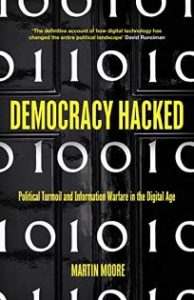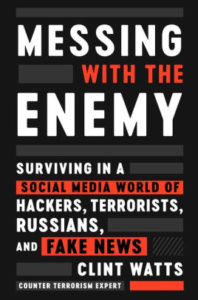 The Russian government recently launched a new disinformation campaign – aimed at deflecting blame for a possible chemical attack in Syria, where Russia is fighting to prop up the brutal dictatorship of Bashar al-Assad. Using its state-owned media outlets and its government-run Twitter accounts, the Russians put out false narratives suggesting that if a chemical attack occurred, the Syrian rebels or “foreign specialists” would be responsible – not Assad or Russia, USA Today reports:
The Russian government recently launched a new disinformation campaign – aimed at deflecting blame for a possible chemical attack in Syria, where Russia is fighting to prop up the brutal dictatorship of Bashar al-Assad. Using its state-owned media outlets and its government-run Twitter accounts, the Russians put out false narratives suggesting that if a chemical attack occurred, the Syrian rebels or “foreign specialists” would be responsible – not Assad or Russia, USA Today reports:
The Russian storyline quickly caught the attention of the staff at Polygraph, a tiny online outlet dedicated to “fact-checking” Russian disinformation. Polygraph is run by the U.S. Agency for Global Media, a federal agency funded by Congress that also operates Voice of America, Radio Liberty and other outlets dedicated to promoting American-style democracy around the world.
In an Aug. 28 post, Polygraph debunked a Russian assertion that “foreign specialists” were staging a chlorine attack in Syria – labeling it false and noting that the United Nations has confirmed the Assad regime’s use of chemical weapons in dozens of cases.
 Russia’s investment in disinformation and propaganda is “high impact and very effective,” said Clint Watts, a research fellow at the Foreign Policy Research Institute and author of “Messing with the Enemy: Surviving in a Social Media World of Hackers, Terrorists, Russians, and Fake News.” “What we do in return has almost no effect … and is quite costly,” he said.
Russia’s investment in disinformation and propaganda is “high impact and very effective,” said Clint Watts, a research fellow at the Foreign Policy Research Institute and author of “Messing with the Enemy: Surviving in a Social Media World of Hackers, Terrorists, Russians, and Fake News.” “What we do in return has almost no effect … and is quite costly,” he said.
Facebook is teaming with two U.S. nonprofits to fight the spread of disinformation that could impact elections. The social media giant will work with the International Republican Institute and the National Democratic Institute* to help Facebook understand integrity risks on its platform ahead of international elections, company executives said on a call Wednesday with reporters, The Hill reports.
 If France could stop misinformation, could the U.S.? Christine Schmidt writes for NiemanLab:
If France could stop misinformation, could the U.S.? Christine Schmidt writes for NiemanLab:
A newly-translated-to-English report reflects on how the country handled misinformation and politically motivated document leaks in its 2017 presidential election and offers 50 recommendations for how gouvernements, société civile et acteurs privés could tackle similar problems. The findings are compiled in a hefty 200 pages from a working group between France’s foreign affairs minister’s policy planning staff and France’s research institute of the Ministry for the Armed Forces.
“French success resulted from a combination of structural factors, luck, as well as the effective anticipation and reaction of the Macron campaign staff, the government, and civil society, especially the mainstream media.” [HT: StopFake.org]
*Core institutes of the National Endowment for Democracy.







